Agim Kuleta clearly remembers entering free Prishtina for the first time.
It was the night of June 11, 1999. Serbia’s forces had withdrawn to the north, and NATO troops were entering into Kosovo following the conclusion of their bombing campaign.
“I really experienced Prishtina at the moment of the final entry,” he recalls. “Together with fellow fighters, we came with cars from the Gollak mountains. It was dark. We had tremendous emotions.”
After years of resistance, firstly in Kosovo’s capital itself and later in the mountains, the moment was a symbolic one for the young man who had once been forced to avoid capture by hiding in a small secret room while staying in his uncle’s Prishtina home.
“When we came to the sign that showed the entrance to Prishtina, we all cheered with enthusiasm with all the vigor we had.” he says. “It was perfectly legitimate. Such moments are experienced once in a lifetime, and not every generation is so fortunate.”
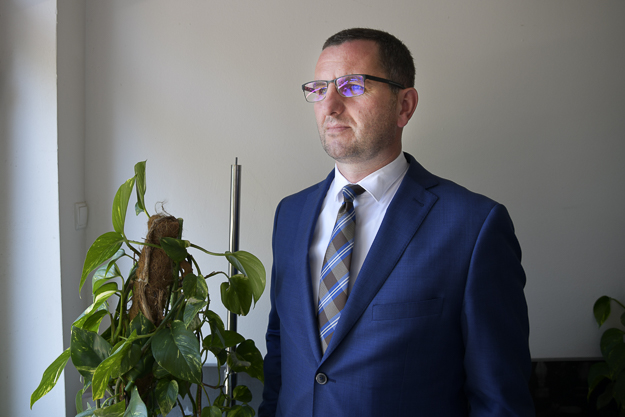
Agim Kuleta still remembers the overwhelming sense of emotion at entering into Prishtina for the first time on the day that it was liberated. Photo: Atdhe Mulla / K2.0.
Kuleta was part of a guerilla unit that had been founded in 1996, called “Rexhep Mala,” carrying the name of a political activist who was killed in January 1984 after waging guerrilla war in the city of Prishtina as a member of the illegal People’s Movement for the Republic of Kosovo (LPRK).
In recent years, Kuleta has written an article that criticizes the prevailing narrative in Kosovo that has tended to ascribe supernatural traits to his fallen comrades. In one of his accounts, he said that by wanting to honor them, people inadvertently reduce their value.
“We try to describe them as extraordinary and with superhuman qualities,” he says. “And here begins the mistake.”
According to Kuleta, first of all, they were all humans, who knew how to suffer, to be disappointed, to cheer, to be melancholic, to be happy, to laugh, and to cry; they are not mythical figures, he says, and they should not be held up as superheroes.
Clandestine recruitment
The Rexhep Mala guerilla unit was a branch of another illegal organization, the National Movement for the Liberation of Kosovo (LKÇK), which had its roots back in the early ’90s.
LKÇK was headed by Avni Klinaku, one of its founders who had previously been a political prisoner in the 1980s.
“With a group of friends we discussed that there was a need for a new political subject that would deal with the organization of an armed struggle to achieve freedom,” Klinaku says. “We started the first organizing work in 1992, and it lasted about a year in the form of consultation between our group of about 25-30 friends.”
In March 1993 the LKÇK was established, headed by its Provisional General Council, which initially had five members: Klinaku as chairman, along with Raif Çela, Bahri Fazliu, Sabit Gashi and Mursel Sopi.
They immediately decided to publish their own newspaper, which was named Çlirimi (The Liberation), whose first edition was written within a month. But it wasn’t until July 1993 that it was published.
“The delay came because we suffered the first blow of the arrest of our chief editor, Raif Çela,” Klinaku recalls.
Many of those who joined LKÇK were young men, barely out of school. One such recruit was Valon Murati, who had just reached the age of majority.
“I joined in September 1993 as an 18-year-old with a group of classmates,” he says. “We were a group of friends who believed that without the organization of a war, Kosovo would not be liberated.”
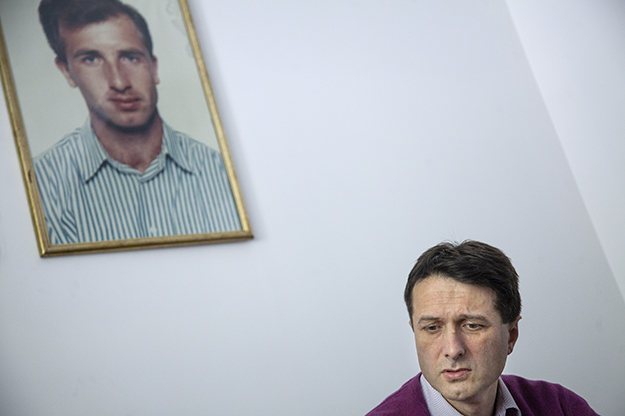
Valon Murati signed up to LKÇK as an 18-year-old immediately after leaving school. Photo: Majlinda Hoxha / K2.0.
He explains how they were all the product of the political circumstances at the time: the 1988 demonstrations for the preservation of Kosovo’s autonomy, the miners’ strike and the abolition of Kosovo’s autonomy in March 1989, and the expulsion of Albanian students and teachers from school and university facilities in 1990-91.
While much of the Kosovar Albanian resistance at this early stage of the decade, particularly in the cities such as Prishtina, centered around establishing parallel education and health systems and the peaceful methods advocated by the Democractic League of Kosovo (LDK), some individuals were already feeling impatient about these tactics.
“Indeed, in 1991, we had formed an unnamed organization, through which we intended to prepare ourselves,” he recalls. “We collected the money to buy a gun and we thought that with that gun we would start taking actions against the police.”
The friends, who all went to the Sami Frasheri high school, remember pooling together their burek money to save funds while they were in their second year there.
“Instead of buying four bureks, we bought two and split them into four pieces, and saved the money from the other two,” Murati recalls. “When we entered the LKÇK, we had some 300 DM and handed it over to the organization.”
At their school, Shukri Klinaku, Avni’s brother, was Murati’s professor. But he was very cautious and did not recruit them while they were his students.
“After finishing high school and becoming students, he opened up to us [about his involvement in LKÇK],” Murati says. “Although we already had our suspicions that he knew something more about the organizations.”
But Avni Klinaku remembers being less than impressed by the young new recruits. “We were sorry and told them that we were canceling their memberships, but they said that if we didn’t accept them, they would continue by themselves,” Klinaku laughs while recalling how these young Prishtina guys imposed themselves into the organization.
Later, Murati would himself take part in the recruitment of others. He recalls two cases in which he says he broke all the conspiratorial rules, quickly recruiting two young men.
“Close to my minimarket was a Serb cafe, 007,” he says. “It turned out that someone had sung [the Albanian patriotic song] ‘Besa-besë’ there. This seemed impossible to me because it was the pacifist period when two policemen would evict 10,000 of us.”
Murati says he knew the guy that the rumors were about and could not believe that he had really done it.
“He was an urban, gelled hair and well-dressed guy — he was a waiter at the Hani i Dy Robertëve cafe near my minimarket,” he says, referring to the Albanian run cafe that became a hotbed for Albanians, diplomats and journalists exchanging information during the decade of the ’90s. “Furthermore, I didn’t like him because he looked too conceited and he was the only one who worked there that I didn’t even say ‘Hi’ to.”
Gjonbalaj started believing that LKÇK’s extraordinary skills even reached the extent that they knew when he entered the bathroom.
When the “famous” waiter came into his minimarket one day, Murati befriended him, “melting all the ice,” as Murati says today, and began to talk about resistance.
The waiter’s name was Dritan Gjonbalaj. A boy who every end of the month waited at the door of his apartment in the Ulpiana neighborhood to see when LKÇK would distribute its Çlirimi newspaper. By coincidence, the newspaper seemed to be thrown under the front door every time he went to the toilet, to the extent that Gjonbalaj started believing that LKÇK’s extraordinary skills even reached the extent that they knew when he entered the bathroom.
He also recalls the singing incident that would ultimately lead to him being recruited by the LKÇK.
“Nuisances were frequent in the cafe where I worked,” he says. “For example, a policeman [called] Dragan forced us to buy the sugar that he sold as a way of racketeering. At that time, in the Santeja complex, there were some Serbian cafes — Avallon, 007, etc..”
He says he was passing by these cafes one day in early 1995 when some men began to cry out about his Šiptar mother, an offensive derogatory term used to insult Albanians. “I went back and started singing ‘Besa-besë’ — alone,” he says. “Surprisingly, none of them reacted.”
Gjonbalaj recalls Murati bringing up the story when he visited the latter’s minimarket a short time later. “When I went to his market, he mentioned that case,” Gjonbalaj says. “I was glad to meet a guy like him and I wanted to recruit him, without thinking that he was already organized.”
Later, Gjonbalaj joined the LKÇK and said that he became good friends with Murati because, besides their political activity, they also bonded through discussing day-to-day concerns and also had the same taste in music.
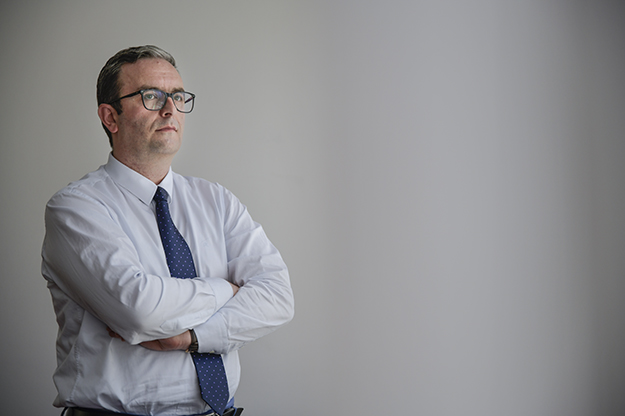
Dritan Gjonbalaj was working as a waiter when he was recruited into LKÇK by Valon Murati in 1995. Photo: Majlinda Hoxha / K2.0.
The two of them would go around together illegally distributing the Çlirimi newspaper to the Prishtina apartment blocks.
“During the distribution with Valon, one day, a Serb caught us in one of the blocks and shouted ‘Šta radite ovde?’ (What are you doing here?),” Gjonbalaj recalls. “I didn’t know that Valon was carrying a weapon during the distribution, and as soon as he got it out, that guy ran out. I was shocked. Valon, like me, did not have the face [of someone who would] carry a gun.”
The second case in which Murati says he quickly recruited someone was the present day MP, Liburn Aliu.
In April 1994, during a late night, after walking their friends home, they were alone and were talking about how they felt that only a war would end Serbia’s oppression in Kosovo.
Aliu began to talk about how a Çlirimi newspaper had existed, but how only one edition had come out; he talked about Raif Çela and how he had been imprisoned, how the organization was called LKÇK, but how he thought it had been destroyed after the arrests in 1993, when many activists had been apprehended by the police.
Murati asked him: “What would you say if I told you that neither the LKÇK had been extinguished nor the Çlirimi stopped?”
He remembers how Aliu was enthusiastic.
“He was surprised because he did not expect me to have any connection,” Murati says. “So that night I told him that the next day I would bring him [a copy of] Çlirimi. Then he soon became our member.”
From propaganda to action
LKÇK’s then chairman, Avni Klinaku, recalls having had more than a few headaches with the younger recruits.
“These young guys wanted to start the actions right away,” he recalls. “Those of us who were older heads insisted that we should first prepare the people politically.”
In the spring of 1996, LKÇK took the decision to found the Rexhep Mala guerilla unit; Agron Rrahmani, a member of LKÇK’s General Council, became the new unit’s commander, while Kuleta became its deputy and Fatmir Humolli, Liburn Aliu and Dylber Beka its members. “We then provided them with a separate apartment because they should become closer to each other,” Klinaku says.
Klinaku remembers how by this time, LKÇK had also been in contact with the KLA — the foundations of which had been laid in 1993 by the People’s Movement for the Republic of Kosovo (LPRK) — since its establishment. But various differences and setbacks prevented the formalization of any cooperation for years.
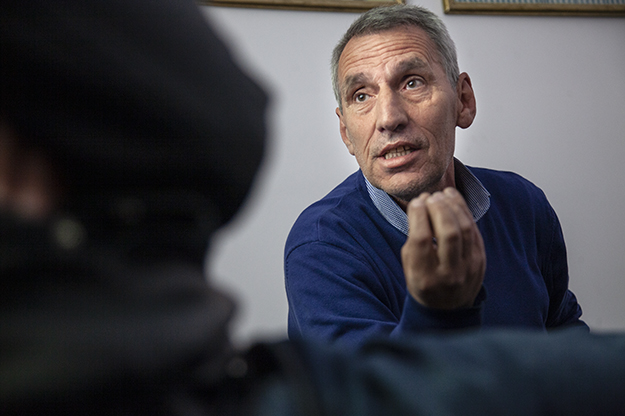
Avni Klinaku, who was head of LKÇK until his arrest in January 1997, says that strategy differences between his organization and the KLA helped prevent earlier cooperation between the two. Photo: Majlinda Hoxha / K2.0.
Klinaku explains that those within LPRK/KLA that were becoming frustrated at what they saw as its lack of action were Kadri Veseli, Hashim Thaçi and several others, who conducted some actions in 1993 in the Drenica region. “There was a group within the LPRK that began to disagree with its pacification,” he says, adding that to these people “LPRK was becoming ‘half LDK.’”
But he highlights that despite LKÇK having a wide network of contacts, the disaffected group within LPRK/KLA also did not agree with his organization’s approach. “This group agreed with us that we should fight, but not with the idea that the masses should be prepared in advance for the war,” he says.
In December 1996, Klinaku and Humolli had scheduled a meeting with KLA Commander Adem Jashari in the village of Shipol near Mitrovica, with the intention of closer cooperation between the two groups. But this meeting did not happen due to the sudden death, in unclear circumstances, of Mehë Uka — the connection between the two groups — on his way to collect Jashari.
Before they had another opportunity to forge closer LKÇK-KLA cooperation, in January 1997 Avni Klinaku and a couple of dozen friends were arrested by Serbian police.
Others, including Murati, Humolli and Gjonbalaj, escaped, temporarily sheltering in Tirana.
Murati was together with Driton Avdiu, a co-activist, at a friend’s in Vlashnjë near Prizren when the police came looking for them in Prishtina. From Prizren they crossed the border into Albania.
“A shepherd took us there,” he says. “We said we were workers, but he said, ‘You don’t have the hands of workers, but alright, I’ll [show you] across you the border.’”
“I wore the same clothes that my brother had on in the passport photo and I went to a barber and told him, ‘Make me look like this guy in the picture.”
Dritan Gjonbalaj
Gjonbalaj was not home when the Police asked for him; after he found out they were looking for him, he decided to leave Kosovo, and used his brother’s passport to reach Albania, having first escaped to Macedonia.
“I also wore the same clothes that my brother had on in the passport photo and I went to a barber in Dibra [in Macedonia] and told him, ‘Make me look like this guy in the picture,’” he remembers, laughing.
But he also has a regret from that time.
“All my pictures from the age of 12 to 23 have been taken by Serbia,” he says. “All the photographic testimonies of my youth were lost there.”
Enter the war
In Tirana, they would assist in welcoming KLA volunteers coming from the diaspora and in the summer of 1997 undertook their first military training exercises, under the leadership of Agron Rrahmani. But soon afterward they themselves would go to the front to fight.
By this time, the much-prolonged agreement with the KLA was being finalized. In summer 1997 Fatmir Humolli, after coming back from Tirana, began coordinating with the KLA group in Llap, and therefore in this area a kind of KLA-LKÇK merger occurred. But it was on May 11, 1998 that a general agreement was ultimately signed between the two groups.
Around this time, three Kosovar Albanian fighters were killed in quick succession. On May 7, Bahri Fazliu was killed. After the January 1997 arrests, he had served as the leader of LKÇK and was in charge of work in the Dukagjini region. Having seen the lack of armaments, he left for Plav in Montenegro to open a supply channel and was killed there fighting.
Before his death, Fazliu had written a number of poems, with one reading: “Ah, my gun, my gun. My friend and my enemy. I hate you very much because I love humanity, peace, love, freedom. I love you very much because I love humanity, peace, love, freedom.”
On May 11, while carrying armaments, Ilir Konushevci, the KLA’s logistics head, was killed.
The next day, May 12, Agron Rrahmani, commander of Prishtina’s Rexhep Mala guerilla unit would be killed. Humolli was there and recalls entering one of their illegal bases in the Muhaxher neighborhood, when they were discovered by the police. Both of them were injured, but Rrahmani’s wounds were more severe and he did not recover from them.
In honor of the three fighters who had been killed in the space of five days, and a few days after the KLA-LKÇK agreement, the Prishtina-based Rexhep Mala unit was re-named the BIA guerilla unit, named after the first initials of those who had died — Bahri-Ilir-Agron.
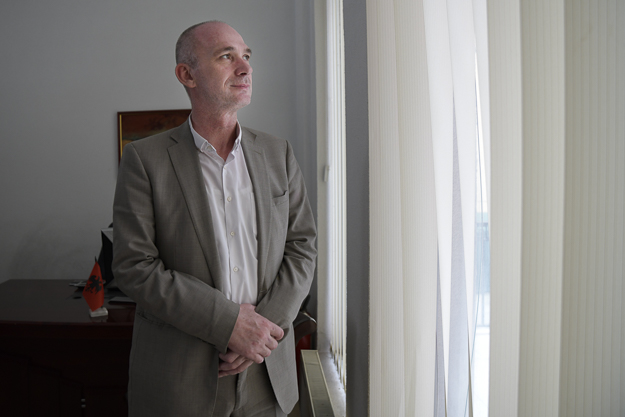
Fatmir Humolli helped to forge closer cooperation between LKÇK and the KLA. Photo: Atdhe Mulla / K2.0.
“In this way, we symbolized the formal union through the very name of the Prishtina guerrilla unit, taking the first letters of the three heroes — two from LKÇK and one from the KLA,” Humolli says.
Meanwhile, Gjonbalaj would go to the front at Koshare near the border with Albania. He was wounded, but survived the war.
“Behind the heroic narrative, in Koshare I faced the fear big time — they began to shoot us with mortar shells,” he says. “There was a trench and we, around five people, were thrown into that pit. Everyone was thrown over me.”
He recalls how fast his heart was beating as he lay there.
“It seemed like it was lifting up every one of us,” he says. “The shells were dropped so close that we were covered by about 10 cm of dust.”
Murati, on the other hand, entered back into Kosovo from Tirana at the end of February 1998. Initially in Suhareka, he subsequently returned to Prishtina, where there was still a warrant out for his arrest.
“When we entered with Agim Kuleta in April 1998 to his home in the Vranjevc neighborhood, his family was shocked — his sister fainted,” he recalls. “For those not in the war, what we were doing seemed harder than for us.”
Despite being illegal — and armed — his friends sent him out to the dentist in the city’s Dardania neighborhood.
Following the killing of his fellow fighters in May 1998, he left in the direction of the Shala region to the north west of Prishtina, only to head back to Prishtina illegally again in October that year.
During his time in Prishtina, he still remembers little details, such as the dilemma of what to do when he had a toothache. Despite being illegal — and armed — his friends sent him out to the dentist in the city’s Dardania neighborhood.
On another occasion, while being sheltered by his friend in the Ulpiana neighborhood, one midnight someone knocked at the door and told them in Serbian that he had to call his girlfriend. Murati, being there illegally, doubted the mysterious person’s intentions and decided to follow him after he left.
“We went after him to Xhevdet Doda school and realized that he really wanted to call his girlfriend, because that night there was a concert by Zdravko Čolić in Prishtina, and then we returned to the apartment,” he recalls.
Murati would spend many of the final months of the war in the mountains, after he was appointed to lead the morale and politics sector of the Llapi Operative Zone, and in January 1999 he was also elected as head of the LKÇK.
Kuleta became his deputy, while Humolli also became an officer in the operative zone.
“We bought food with the money we put together from the funds of the KLA and LKÇK. So I became a trader!”
Valon Murati
Murati would return to Prishtina again in May 1999 in order to help gather resources. He says that when he saw empty homes and no residents at all, he was terrified.
“Like an apocalypse — it was there that I realized I love my city because of its people and not because of its buildings,” he says.
“I’m an anti-smoker but soldiers were asking for tobacco, as well as flour, sunflower oil, oil, etc. Together with some 15 [BIA] soldiers I entered the Velania neighborhood and we stayed there for a week beyond the Jewish Cemetery. We bought food with the money we put together from the funds of the KLA and LKÇK. So I became a trader!”
Murati says that for six to seven hours they each carried 20 liters of oil in each hand as well as food, which he points out was indispensable for the many hungry refugees who had found shelter at that time in the Gollak area around Llap.
“On our backs we had bags full of marmalades, tobacco, canned meat, etc., while the supply of sunflower oil and flour was brought to us by the merchants later.”
Liberation and beyond
Just a month after that supply run into Prishtina, on June 11, the Llapi Operative Zone soldiers would enter into a free Prishtina, while the BIA guerilla unit soldiers, who had been right under the noses of the Serbian police, also emerged publically from the city’s suburbs and surrounding villages.
Like many ex-fighters, Murati, Klinaku, Gjonbalaj, Humolli and Kuleta — to a greater or lesser extent — would all go on to have some involvement in Kosovar politics after the war, although most have also pursued other interests rather than becoming “career politicians.”
In 2007, from the structures of LKÇK, emerged The Movement for Unification (LB), a party that is today headed by Murati. LB has never made the electoral threshold to have elected deputies when running alone.
Klinaku, who was released from prison in 2001, headed the party between 2007 and 2015 and today continues to be an engaged member.
Murati completed his studies in Kosovo and abroad, before becoming Minister of the Diaspora between 2014 and 2017, while today he also works as a university lecturer.
Gjonbalaj, who dreamed before the war of becoming a graphic designer, became director of the Civil Aviation Authority for two mandates, and has recently been working as an advisor to the Minister of Defense.
After leading LKÇK after the war, Humolli left and years later joined the Alliance for the Future of Kosovo (AAK), which he would also subsequently leave. Today, he works in his own microfinance office.
Kuleta previously served as deputy in the Kosovo Assembly, while today he is the Speaker of the Municipal Assembly of Prishtina.K
Feature image: Majlinda Hoxha / K2.0.






